
The Tibetan Centre for Human Rights and Democracy (TCHRD) exposed major human rights violations committed by Chinese government in Tibet and the repressive policies that facilitate these violations during recent meetings and interactions with politicians, diplomats, academics, media and the general public in Basque Autonomous Region (Basque Country), Spain.
During a weeklong visit to Donostia/San Sebastian in Gipuzkoa Province, Basque Country, TCHRD executive director Tsering Tsomo drew attention to the repressive state of affairs in Tibet where the Chinese authorities continue to adopt a hardline approach denying basic human rights and freedoms that are taken for granted in many other countries. In her various public and private meetings, Tsomo strongly condemned China’s use of force, violence and fear to extract absolute loyalty and obedience from Tibetans to its repressive rule, and called Tibet a human rights black hole, a major blot on China’s international standing and reputation.
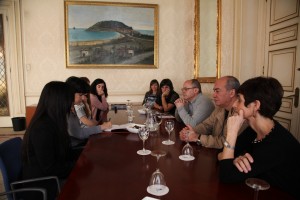
Phagma Drolma NGO, an association for solidarity for the Tibetan people based in Donostia/San Sebastian, organized Tsomo’s visit to Basque Country.
On 13 April, Tsomo was welcomed by the mayor of City Council of Donostia/San Sebastian, Juan Karlos Izagirre and the President of the Provincial Council of Gipuzkoa Province, Martin Garitano. During the meeting with Mr Izagirre and Mr Garitano, Tsomo gave a detailed update on the human rights situation in Tibet and highlighted the rising number of self-immolation protests. “Tibetans are choosing to die than live under repressive Chinese rule in Tibet,” Tsomo said. The mayor expressed his support and explained how they have been supporting the Tibetan cause in recent years through institutional statements and displaying the Tibetan national flag atop the city council building on 10 March, that is observed by Tibetans and supporters worldwide as anniversary of Tibetan National Uprising of 1959. The President of the Provincial Council of Gipuzkoa also expressed his support and explained that the Council has supported the Tibet cause through grants towards Phagma Drolma NGO’s projects for Tibetans in exile. Gipuzkoa is one of the three provinces that comprise the Basque Autonomous Region (Basque Country). Donostia-San Sebastian is the capital city of Gipuzkoa.
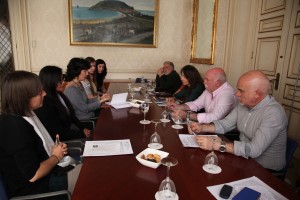
The same day, Tsomo was welcomed by all political parties represented at the City Council of Donostia/San Sebastian: two representatives of the Basque Nationalist Party (PNV/EAJ, currently leading the Basque Government); two representatives of the Spanish Socialist Party (PSOE), and one representative of the People’s Party (PP, currently leading the Spanish Government). Tsomo gave first hand information about the situation in Tibet at a meeting with the representatives of all political parties, following which the representatives asked what could be done from the Basque institutions to help the Tibet issue.
During the visit, Tsomo addressed a press conference, which was attended by many media outlets, including influential Basque newspapers and radio, Spanish newspaper El Pais and news agency Europa Press. The news about Tsomo talking about the “black hole of human rights” in Tibet was published in all Basque newspapers and in the Basque national radio. The GARA newspaper, a bilingual (Spanish/Basque) newspaper published an interview with Tsomo on its front page and an interview with Tsomo was broadcast live on “La Casa de la Palabra” program on EITB, the Basque National Radio, both media are one of the most popular in the Basque Country.
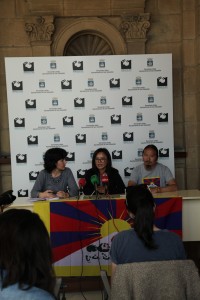
On 15 April, the Human Rights Commission of the Basque Parliament invited Tsomo to give a presentation on the human rights situation in Tibet. In her presentation, Tsomo talked about the persistent political repression, cultural destruction and economic exploitation of Tibetans under Chinese rule, and made a special mention of China’s sinister policy of assimilating Tibetan culture and identity. All political parties expressed their concern for the human rights violations in Tibet and support to the Tibetan people. Responding to Tsomo’s request to resurrect the Intergroup for Tibet at the Basque Parliament, the People’s Party representative, a former member of the now-defunct Euskadi/Tibet group proposed to revive the intergroup, which was supported by representative of EH Bildu (a left-wing, Basque nationalist and independentist political coalition from the Basque Country and Navarre).
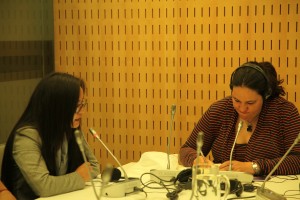
It was also proposed that the Basque Parliament should issue an updated version of the ‘Institutional Statement’ on Tibet. The statement was first issued by the Basque Parliament in 1995 following which the Intergroup on Tibet was formed. The statement of the Basque Parliament expressed support to the Tibetan people and insitutions in exile and Tibetan people’s right to self-determination, requesting the international community to urge China to respect human rights in Tibet. Earlier in the day, Tsomo also met with Lohitzune Txarola, the president of Gipuzkoa Provincial Parliament with whom she discussed the situation inside Tibet.
Thanks to Phagma Drolma, Tsomo was able to meet with the organisers of the San Sebastian Human Rights Film Festival and discuss the viability of screening Tibetan human rights documentaries in future. The aim of the festival is “to promote greater awareness, as well as encourage debate and provide greater information to citizens about human rights, by promoting, through the cinema and other cultural and artistic expressions, the values of solidarity, respect for life, peace, freedom and social justice, among other things.” Tsomo, along with the staff of Phagma Drolma, attended the opening night of the festival on 17 April.
On 14 April, Tsomo gave a public conference on human rights situation in Tibet at the KM Kulturunea center in Donostia/San Sebastian. The conference lasted for more than two hours including interaction with the audience as well as a 15-minute video of José E. Esteve, the Spanish lawyer in charge of the Tibet lawsuit, explaining how political and economic interests interfered into the Spanish justice system and how it affected Tibet and other international lawsuits. The conference was streamed online with simultaneous interpreter service in Spanish.
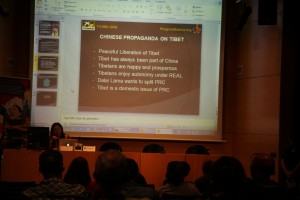
On 17 April, at the Basque Public University, Tsering met with Professor Juan Soroeta who is a well-known expert on the issue of Western Sahara, and the struggle of the Saharan people. Prof Soroeta is also the founder of a human rights NGO called Asociación Internacional para la Observación de los Derechos Humanos (AIODH, International Association for the observation of Human Rights). In addition to Western Sahara, AIODH focuses on the Palestine and Tibet issues. TCHRD has offered collaboration on the NGO’s website, by providing accurate, verified information about human rights issues in Tibet. It was also proposed during the meeting to send students of human rights and international law to intern at TCHRD. TCHRD has received from Professor Juan Soroeta the invitation to participate in the next edition of the Human Rights Course organized by the Basque Public University and the City Council of Donostia-San Sebastian, where Tibet would be one of the main case studies.
